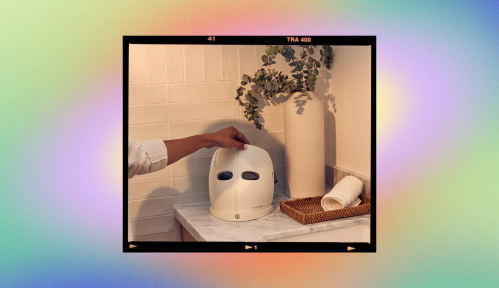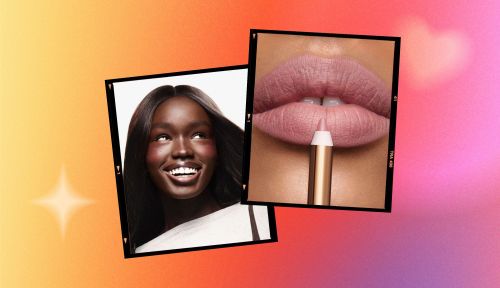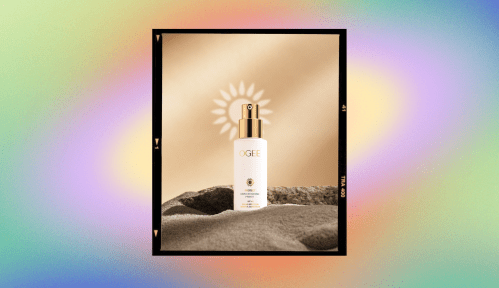Our editors independently select these products. Making a purchase through our links may earn Well+Good a commission
The Right Way To Shave Your Butt, According to Experts
Looking to get rid of the hair between your cheeks? Experts breaks down exactly how to shave your butt.
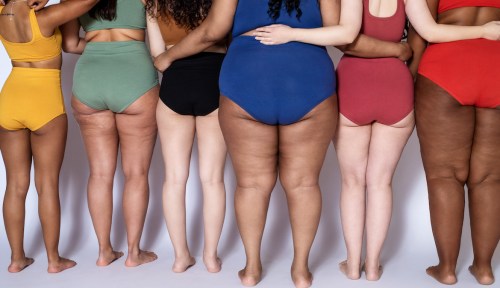
So, you’re here because you want to know how to shave your butt. Or maybe you’ve landed on this page because you’re like: ‘Wait, is this a thing?’ Either way, welcome! Now, let’s talk about one of beauty’s most taboo topics.
Experts in This Article
anal surgeon and founder of Bespoke Surgical and Future Method
board-certified dermatologist based in Atlanta
Like all body hair, it’s a personal decision to decide whether or not to shave your butt. But considering the process requires you to use a sharp blade where the sun don’t shine if you are going to groom the area, it’s safe to assume you want to get it right—I, personally, can’t imagine anything worse than cuts or ingrown hairs on your anus.
With that in mind, we chatted with Brendan Camp, MD; Evan Goldstein, DO; and Tiffany Clay, MD for their tips on how to safely shave your butt at home—so grab your razor (and maybe a hand mirror?), and let’s get to work.
Wait—why is there hair on our butts in the first place?
As annoying as the peach fuzz between your cheeks can be, there’s a pretty good reason it’s there. “Perinium hair acts as dry lubricant, meaning that it helps minimize the frictional forces between the butt cheeks that may otherwise cause skin irritation. It can also help trap and contain loose fecal material,” says Dr. Camp, who likens the hair on your butt to the hair under your arms.
“These areas both experience lots of sweating, bacteria, and secretions, so it’s meant to be a sort of protective lining,” adds Dr. Goldstein.
But while this protective lining may have been critical back when humans were hunting and gathering, these days, it’s not so important. “Our lives have clearly changed since we used to roam around naked—now, we sit all day at our desks, we sweat and wear old (and maybe even dirty) underwear, and we don’t let the area breathe,” says Dr. Goldstein. “So while butt hair serves specific purposes, these purposes are evolving and its necessity isn’t the same as it once was.”
Is it a good idea to shave your butt hair?
As long as you bathe regularly and wipe well, Dr. Goldstein confirms that you’re all good to do some DIY butt hair removal—and aesthetics aside, there are a few good reasons you may want to try it.
“When it comes to friction-related issues [like butt acne], hair is a major culprit—many people have super thick and coarse bushels of hair that can lead to the overgrowth of microbes, which can then cause irritating ailments,” says Dr. Goldstein. “Quite frankly, most people don’t even know how to clean their ass after they go to the bathroom, so then they sit all day in literal shit and their butt hair just compounds the issue.”
Additionally, for those who engage in anal sex, butt hair can make things…messy and uncomfortable. “The more hair someone has on their butt, the more it can limit lubricant dispersion and minimize the benefits lube has,” says Dr. Goldstein. “It can even create more issues with analingus, because saliva can also get trapped in the hair and on the skin.”
How to shave your butt
Curious to know how to safely remove your butt hair? Here are expert-approved tips for shaving, ahead.
What you’ll need:
- Sharp, clean razor with a skin guard or a trimmer with a skin guard
- Shaving cream
- Handheld mirror
- Trimmer (optional)
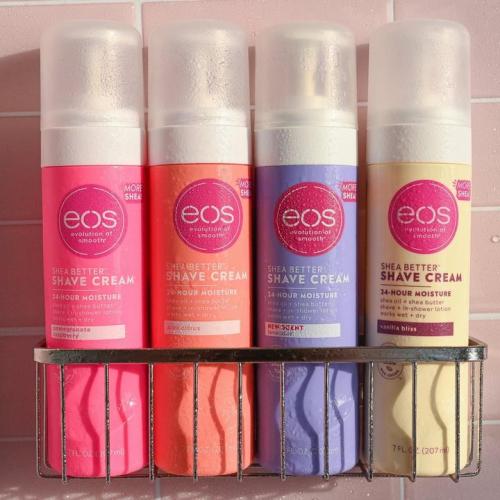
Eos Shea Better 24hr Moisture Shave Cream — $5.00
This non-foaming shave cream uses shea oil and shea butter for a smooth, close shave that lasts.
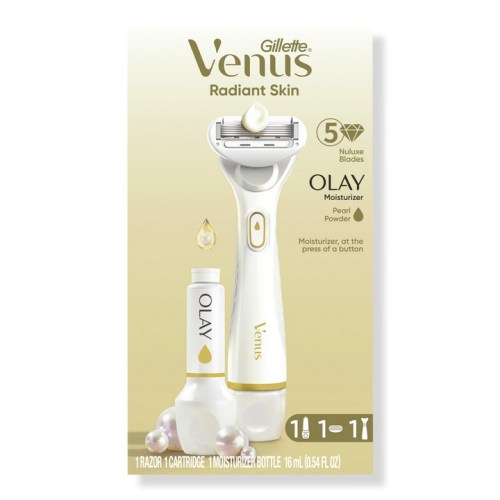
Gillette Venus Radiant Skin Razor — $40.00
This 5-blade razor comes with an Olay moisturizer dispensing button, allowing you to moisturize your skin while you shave.

Bushbalm The Francesca Body & Bikini Trimmer — $65.00
This rechargeable waterproof trimmer comes with a pre-wax bikini trimmer guard, allowing you to get the perfect trim before your next wax appointment.
Butt shaving techniques:
“If you’re shaving, you have to remember that it’s pretty difficult to get a good look at your anus and the skin in this area is super thin and delicate,” says Dr. Goldstein. The same is true of your butt cheeks in general—albeit slightly more viewable.
If you decide to forge ahead, Dr. Goldstein first recommends having a partner do it for you—especially if you’re focusing on your anus, specifically. If you go at it solo, at the very least, try to get a good view in a room that’s well-lit, and consider using a handheld mirror for even better (read: safer) accuracy. Choose a razor for sensitive skin (he says nowadays a lot of women’s razors for legs fall into this category), and use shaving cream or some other type of lubricant to try to minimize irritation.
“As you can imagine, shaving your butt requires some acrobatics and body contortion,” says Dr. Goldstein. He recommends first trimming the longer hair with a clipper “so you’re not getting so close to the skin on the first go” before going in with your razor.
Make sure you’ve got the best view possible, and use one hand to spread your cheeks apart while your other goes in with the razor. “Start from the inside out, on the left and right sides, followed by the front and back. Follow the skin lines and use extra caution,” he says. “Be sure to go extra slow on the front and back area as this skin is much thinner and more prone to injury. Fortunately, for most people, hair doesn’t grow right on the hole itself, so you really only have to trim or shave around it and on the cheeks.”
Pro tip: Dr. Clay says that shaving at the end of your shower or bath will make the process go a lot smoother. The reason? By then, your butt hairs — whether on your hole or cheeks — will have been notably softened by the warm water and soap, and your skin will likely have been exfoliated from washing. Additionally, she says to always shave with the grain to avoid any irritation.
Other Methods of Hair Removal to Consider
While shaving is one of the quickest, easiest, and cheapest ways to remove your butt hair, experts say that doesn’t necessarily mean it’s the *best.*
“I’m not a huge fan of shaving your butt,” says Dr. Goldstein, who dedicated an entire chapter to the subject in his forthcoming book, Butt Seriously: The Definitive Guide to Anal Health, Pleasure, and Everything In-Between (out May 28). “Ingrown hairs are inevitable; it makes you really acne-prone; and as the hair grows back, it’s like spikes that can lead to more and more friction and irritation. I see anal warts and herpes outbreaks in those who already have it, as well as other local issues all because of shaving.”
The good news is that there are other options. Considering this is one of the most personal things you can possibly do, it’s really about finding what feels right for you.
Laser hair removal
If you’re looking to remove your bum hair for good, Dr. Goldstein recommends laser hair removal. While razors cut off the hair above the surface of your skin, lasers remove it at the root and prevent it from growing back, making you less prone to ingrown hairs. “Laser hair removal offers more permanent hair removal by damaging the follicle through a process called selective photothermolysis,” says Dr. Camp. “After a series of treatments, the follicle will not regrow if it has been sufficiently damaged.”
Once you’ve gone through the initial course of treatment, the results are fairly permanent (though you may have to do some touch-up sessions every few months), and the fact that it keeps you from having to shave lowers the likelihood of razor bumps and folliculitis down the road.
Waxing and depilatory products
If laser hair removal is out of the question due to its lofty price, there’s always the option to wax your butt. Unlike shaving, waxing targets butt hair removal at the root. It doesn’t go as deep as laser hair removal, however, so your hair will eventually grow back—typically within three to four weeks.
You can also use depilatory creams, which sit on top of the skin and weaken the hair so it can be easily wiped away with a cloth. However, “While these products temporarily remove perenium hair, they—like waxing—require frequent maintenance, because they leave the follicles intact so they can eventually grow a new hair,” says Dr. Camp.
Whatever method you choose, Dr. Goldstein cautions you to be extra careful because, after all, this is your butthole we’re talking about. Thanks to the amount of bacteria in this region, there’s a potential for contamination and infection within small cuts and scrapes. He also notes that you should be aware of potential complications, such as ingrown hairs, abscesses, HPV and HSV activity, and the development of skin tags and other growths.
How to prevent ingrown hairs on your butt
Of all the places you can possibly get ingrown hairs, your butt crack might just be the worst (second only to your labia, that is). To avoid them, Dr. Goldstein recommends using an exfoliating scrub to slough off any dead skin cells that could potentially trap hair under the surface of the skin. just be sure that whatever you’re scrubbing with is safe for your intimate parts— Future Method’s Butt & Body Acne Scrub ($35), which was designed by Dr. Goldstein himself, is a great option.
Additionally, getting a bump-free butt shave requires using “a dedicated razor or shaver that’s specific to your butt and only used for that purpose,” says Dr. Goldstein, as this will help prevent the transfer of bacteria. Most importantly, be sure to clean it before and after every use, and store it outside of the shower to keep it sharp.
How to treat ingrown hairs on your butt
If you do experience acne or ingrown hairs after shaving your butt, Dr. Goldstein recommends using a cleanser with salicylic acid.
“After shaving, lather the cleanser on your butt and leave it on for three minutes,” he says. “This will help a lot in preventing ingrown hairs and butt acne that results from clogged hair follicles.”
And if you’re planning on doing butt stuff during sexy time and experience any irritation or nicks, he recommends waiting three to five days for things to calm down, and then using a toy and exploring yourself to make sure everything is copacetic before bringing in other people.
Why does my butthole itch when I shave it?
Shaving your butthole—even when using the proper tools—can potentially cause irritation. “Tears or little cuts in the skin that happen during the process of shaving can become very itchy as they heal,” Dr. Clay admits. “Think of a skinned knee that’s healing and how itchy it can get.” What’s more, Dr. Clay says that itching can also be a sign of razor bumps or ingrown hair—more on those, below.
What can I do to prevent itchy razor bumps after shaving?
Hoping to uncover how to treat razor bumps on your buttocks? The best way to prevent razor bumps is to properly prepare your skin before shaving. Generally speaking, you should never shave on dry skin. Instead, dampen the area and use shaving cream to create glide for your razor. Then, after shaving, Dr. Clay says to use an anti-inflammatory to calm the skin.
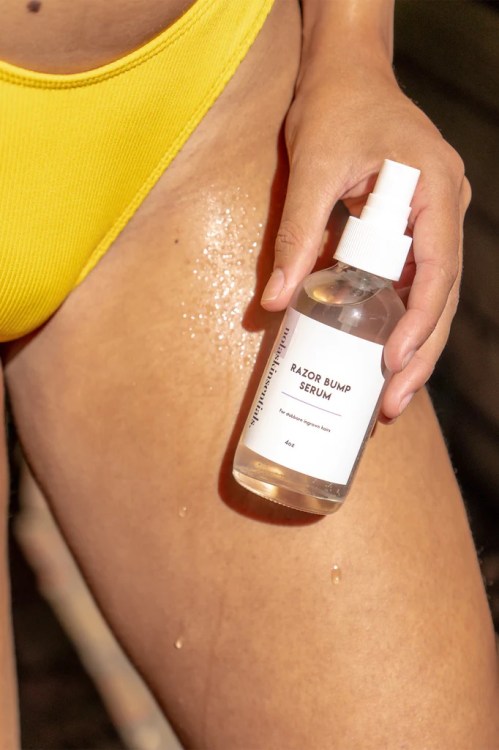
Nola Skinsentials Razor Bump Serum — $25.00
Formulated with tea tree oil and aloe, this serum stops razor bumps in their tracks while keeping your skin soft and hydrated.
Why do people get ingrown hairs?
Like razor burn, ingrown hairs are common with shaving. They’re caused by hairs getting stuck under dead skin cells that have yet to slough off. With that in mind, Dr. Clay reminds us of the importance of exfoliation—even down there. “Exfoliate the skin regularly with a chemical exfoliant or a physical exfoliant to remove dead skin, minimize clogged pores/follicles, and release any hairs that are trapped under the skin,” she says.
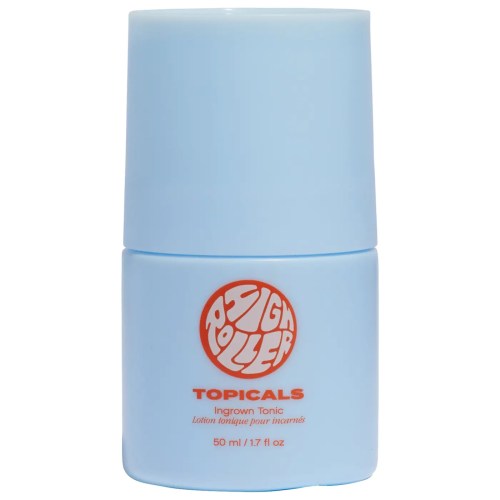
Topicals High Roller Ingrown Hair Tonic with AHA and BHA — $26.00
This lightweight serum combats redness and prevents ingrown hairs on your face, armpits, and bikini area with the help of glycolic acid and niacinamide.
Final takeaway
While it’s perfectly normal to have butt hair, it’s also perfectly normal to want to remove it (or not). If you’re curious about shaving down there, it’s important to understand that yes it is completely safe, but definitely isn’t something you should go into blindly (to avoid potentially irritating or cutting your skin). With the above tips and tricks butt-hair removal can be an easy add to your body care routine if you so wish.
Sign up for the Well+Good SHOP Newsletter
Get exclusive deals on wellness, beauty, fitness, and food products that have been hand-picked by our editors.
Got it, you've been added to our email list.

